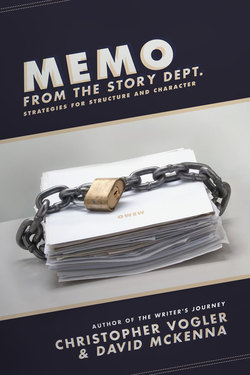Читать книгу Memo from the Story Department - Christopher Vogler - Страница 13
На сайте Литреса книга снята с продажи.
ОглавлениеCHAPTER THREE
WHAT'S THE BIG DEAL?
—— VOGLER ——
Hollywood is a sink-or-swim industry where they rarely take time to teach you anything, but I got a useful lesson early in my career when I was a reader for Orion Pictures. Our story editor called a meeting of the readers to tell us none of us had any idea what a scene was. I was surprised; I thought I knew. A scene is a short piece of a movie, taking place in one location and one span of time, in which some action takes place or some information is given. Wrong, she said.
And proceeded to explain that a scene is a business deal. It may not involve money but it will always involve some change in the contract between characters or in the balance of power. It's a transaction, in which two or more people enter with one kind of deal between them, and negotiate or battle until a new deal has been cut, at which point the scene should end.
It could be the overturning of a long-established power structure. The underdog seizes power by blackmail. The people rise up against a dictator. Someone tries to leave a relationship or overcome an addiction.
Or it could be the forging of a new alliance or enmity. Two people who hated each other make a new deal to work together in a threatening situation. A boy asks a girl out and she accepts or rejects his offer. Two gangsters make an alliance to rub out a rival. A mob forces a sheriff to turn a man over for lynching.
The meat of the scene is the negotiation to arrive at the new deal, and when the deal is cut, the scene is over, period. If there's no new deal, it's not a scene, or at least it's not a scene that's pulling its weight in the script. It's a candidate either for cutting or for rewriting to include some significant exchange of power.
The story editor pointed out that many writers don't know what a scene is, either, and put in non-scenes that are just there “to build character” or to get across exposition. They don't know when to begin and end a scene, wasting time with introductions and chit-chat and dragging the scene out long after the transaction has been concluded. The scene is the deal. When the deal is done, get off the stage.
I found this principle very useful in pinning down the essence of a scene, and I found it also works at a macro level for identifying the bigger issues in a script, for every story is the renegotiation of a major deal, a contract between opposing forces in society. Romantic comedies are a re-negotiation of the contract between men and women. Myths, religious stories, and fantasies rework the compact between humans and the greater forces at play in the universe. The terms of the uneasy balance between good and evil are re-evaluated in every super-hero adventure and story of moral dilemma. The climax of many movies is a courtroom judgment that lays out a new agreement, passing sentence on a wrongdoer, proclaiming someone's innocence, or dictating terms of a disputed transaction. In all situations, we go in with one deal and we come out with a new deal having been cut.
Knowing when the big deal of the movie has been cut tells you when the movie should be over. Many movies today go on long after they have truly ended, as far as the audience is concerned. They know it's over when the last term of the deal has been decided, and they get restless if the filmmaker goes on with extra flourishes and codas and flash-forwards to ten years later, etc. When I was a kid going to drive-in movie theatres I noticed many people starting their engines and driving away before the last movie of a double bill was quite over. For them the deal of the whole movie was complete when the monster was killed or the murderer was caught, and they didn't need to stick around to see the hero kiss the girl and ride off into the sunset. “When the deal is done, get off the stage” is a good rule for scenes and for the overall structure of stories as well.
NOTE FROM McKENNA
One of my perks for being a “friend of Vog” is access to unexpected eruptions from his volcanic brain. His thought-bombs are sporadic and unpredictable. Sometimes they subject me to long and winding treks down the bottomless rabbit hole. But more often than not, they point me to the mother lode.
“What's the Big Deal” is pure gold. I got it in the mail one morning, and I immediately jettisoned my lesson plan for that afternoon's screenwriting class. I printed up the memo, snatched a random video from the library and presented both to my students.
With the memo in mind, we began to watch the DVD and instantly pinpointed the scenes which were working and those that dragged. We had a new diagnostic tool to add to our storytelling gear! From that point and for the rest of the semester, we discussed student scenes in terms of “deals.” The level of writing got a whole lot better.
Chris doesn't name the Orion story editor who caught and shared this nugget, but let me toss a few kudos in his/her direction…
Reply from Vogler: For the record, her name was Migs Levy and she deserves those kudos. Whatever kudos are.
